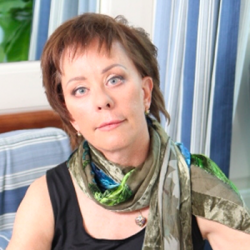A Matter of Life and Death
by Valerie Sartor
Water in New Mexico is always a priority, so I rarely take baths. But whenever I shower, I notice the Lake Baikal-shaped scar across my right side, and I remember Dr. Kuklin.
In 1985, a surgeon in Moscow saved my life. I was a scholarship student on a three-month student study tour of the Soviet Union, hoping that the trip would make me academically competitive with my peers, mostly snotty Ivy League kids.
It was springtime in Moscow. Every day we, like the other Western capitalist kids, had to go to a series of lectures. Language classes were ostensibly based on our acquiring a good command of Russian, but in reality they consisted of an old crone in a bad suit and a worse haircut droning on and on about Russian participles. Other classes were propaganda meetings headed by unsmiling members of the Young Communist League. We Western invaders stood in one corner sipping stale sulfurous fizzy water while our Communist peers glared at us from the other end of the room. Academic life, truthfully, wasn’t much fun.
Weekends were better. Our Argentina-born Russian academic group leader, Natasha, led us around Moscow like a group of newly hatched chicks, educating us about the beauty of Russian culture. It was during one of these excursions, at the famous museum housing Fabergé eggs and the carriages of Catherine the Great, that I collapsed. The on-duty granny security guard, seeing me fall, scurried over to where I lay crumpled. She kicked me with her old slippers.
“Get up, capitalistka, how shameful you are, coming here intoxicated!” she hissed.
“She’s not drunk, granny,” said Bette, my plump blue-eyed roommate from Wisconsin. “She’s ill.” Granny grudgingly stepped back and started sweeping at imaginary dust while Bette dragged me up by my armpits.
“Is it your stomach?” Bette whispered to me. “I had diarrhea last night myself from the fermented cabbage soup.”
“Something feels weird, and my right side is hot,” I said. With her help, I managed to stand. Bette found Natasha and got permission for the two of us go to the student hostel. On the bus, I fainted twice. By the time our group had arrived back after the tour, people were starting to worry about me.
In Moscow in the 1980s, cabs were scarce. Foreigners stood on the road and waved dollars. Natasha did this, in vain, until an old lorry stopped.
“Five dollars and I take you anywhere,” said the gruff redheaded Russian driver.
“Botkinskiya Hospital,” said Natasha, giving him five ones. He lifted me onto the truck flatbed.
After arriving, Natasha put me in the care of a prim Soviet nurse and went to the US embassy. This nurse, along with a burly janitor, lifted me onto an ambulance gurney after first wiping it clean with vodka. I lay still, tired, and, at times, feverish, my right side burning intermittently. The lights in the corridor flickered, and I imagined myself camping under the stars. I closed my eyes and dozed.
Opening my eyes, I saw a jovial man with a bearded face holding a Russian cigarette between his lips. “Aw, yes, the Amerikanka, my sleeping beautiful, has woken. You, my dear, are very ill. You have exploding appendix,” he said calmly. “We wait for Amerika attaché, for life or death.”
As he spoke, a dapper little man wearing a blue suit with an American flag tiepin approached. “You must be airlifted now. No way can you be operated upon here. This is Soviet territory, impossible,” he stated flatly.
The surgeon stretched through his white coat like a cat and casually flicked his cigarette ashes onto the sheet that covered me. “Hmmm,” he purred, drawing in cigarette smoke.
“This is ridiculous,” said the attaché. “Smoking is forbidden. Get her off that thing and into the car now.”
“And you, devushka (young lady), how you feel about politics? Plane ride to Helsinki—long, the poison—running now, that why you feels hot.” He flicked ash onto my body, grinning with his feline cheekbones and yellow teeth. “I am Dr. Igor Kuklin, by the way, a famous surgeon.”
“Yeah, right,” muttered the US attaché. As if dreaming, I saw he was holding a box of American Kleenex, ostensibly a gift for me in case I started to cry.
“Dear devushka? You decide: your body, your life?” said the doctor, crushing the cigarette on the floor.
I looked at him; he smiled kindly at me. I looked at the attaché; he scowled at the ceiling. “I’m tired. Please operate, Doctor.”
The US attaché was furious, but left me the box of Kleenex. Dr. Kuklin was again smiling over me when I woozily woke up.
“You did good, my capitalistka, I cleaned out much poison. But you have souvenir: big scram (scar). It help you never forget Dr. Igor.” Weak but coherent, I nodded, and he patted my cheek. “Good for international relations,” he said. “Russian bear does not bite.”
For weeks I lay on a hospital cot alongside six Soviet patients whose family members spoon-fed me from the jars of soup they brought for their own near and dear. Finally, I was allowed to leave. I asked Dr. Kuklin, by now a familiar presence, how I could repay him; at that time, Soviet medicine was free.
“Aw, yes,” said the doctor, plucking a cigarette out of his white coat pocket. “A bottle of Chivas, at the bereoiska (hard currency) store, that would be heaven gift. And a story, someday a story about your dear Dr. Igor.”
I smiled and promised him both. The whiskey he got that day. The story has taken me decades—but a promise is a promise.
Published on April 14, 2016

